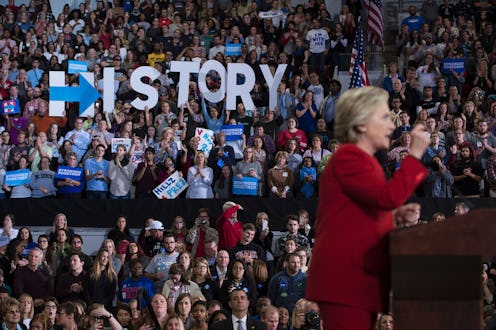News
Implicit Sexism Is Present In The 2016 Election
As usual, President Barack Obama put into words the thing that most people don’t dare address. At a speech in Columbus, Ohio last week, he posed a tough question to male voters. "I want every man out there who's voting to kind of look inside yourself and ask yourself: If you're having problems with this stuff, how much of it is, you know, that we're not just used to it?" he asked. It was a simple question, but it has profound implications for women everywhere. The simple inquiry made me wonder: what does the kind of implicit sexism Obama addressed look like outside of hypotheticals?
While undoubtedly some voters sadly believe that women should not, under any circumstance, be able to hold the highest office of the United States, Obama seemed to be aiming at a much trickier group. These (mostly male) voters typically believe that our society is free of gender bias, which prevents them from understanding how they could still be part of a problem that, in their minds, does not exist.
But gender bias is alive and well in Clinton’s campaign. “American women usually don't succeed in politics — or other professions — unless they act like men," Joan Hoff, a political historian at Montana State University, told NPR about Clinton’s first campaign. That doesn’t mean peeing standing up or anything like that. It means abandoning the unconscious associations that society has for women. For example, some automatically assume women have a warm, caring, or emotional demeanor. Though none of those are bad things, Nichole Bauer, an assistant professor of political science at the University of Alabama, noted to the Washington Post that voters sadly don't associate those characteristics with the presidency.
Some have argued that Clinton has embodied many of the masculine stereotypes desired in politicians in response to such biases. In August, Jennifer Jones detailed an analysis she had performed of Clinton’s speaking style in the Washington Post. According to Jones, Clinton now talks more like a man, and has, over time, tweaked her speaking style to conform with what studies have established as a masculine way of speaking.
Still, that hasn’t stopped the double-standard of subconscious sexism from creeping in. Think back to the Democratic primaries when Clinton was debating Bernie Sanders instead of Donald Trump. Clinton was mocked by partisans on both sides of the aisle for screaming during debates, and it was continually suggested that her tone of voice was off-putting to viewers. Meanwhile, Sanders bellowed his promises at a similar decibel and was praised for his passion.
As the Washington Post notes, some voters perceived Clinton as a maternal figure yelling directly at her proverbial children of America, not a woman trying to express her fervent desire for change. So despite conforming to many of the masculine traits that, according to academics, should make her a better candidate by proxy of acting like a man, she was dinged only for the misstep of being a woman.
And that brings me back to Obama’s initial point: maybe voters just aren’t used to seeing a female presidential candidate. Because, like it or not, it’s true that Clinton is an anomaly. Although certainly not elected with the same frequency as their male counterparts, women have managed to break into national politics. In November 2015, the combined total of women in the U.S. House and Senate passed 100 for the first time. That’s only 20 percent of Congress, but it’s still safe to say that women aren’t exactly unicorns in the hallowed halls of the Capitol. The presidency, however, is a different story.
Nichola D. Gutgold, the author of Almost Madam President: Why Hillary Clinton ‘Won’ in 2008, told NPR that “there is evidence that the more women who run for president the less that gender matters — because women will not be seen as novelty candidates.”
Now, why would women be seen as a novelty? Because they don’t inherently inhabit that sphere, and thus are seen as some sort of outsider that is more useful as an exception to the rule. And that is a classic example of implicit sexism. It isn’t that anyone is actively not wanting Clinton to be president because she’s a woman, it’s that it doesn’t feel right because, well, she’s just different (read: a woman).
Perhaps if Clinton was running against, oh, I don’t know, anyone else, the gender bias in the elections wouldn’t be so clear. But Trump, by all intents and purposes, is matching his lack of experience in public life against one of the most well-heeled presidential candidates in the past few decades. Clinton is extraordinarily qualified to lead the nation, but unfortunately, her biggest drawback for many voters is that she’s a woman. I’ll let Obama take it from here:
When a guy's ambitious and out in the public arena and working hard, well that's okay. But when a woman suddenly does it, suddenly you're all like, 'Well, why's she doing that?' I'm just being honest. I want you to think about it because she is so much better qualified than the other guy. She has conducted herself so much better in public life than the other guy. This notion that somehow it's hard to choose, it shouldn't be.
And if Clinton becomes president, the implicit sexism Obama is referring to will begin to disappear, because it's about time having a woman president was considered "normal."
